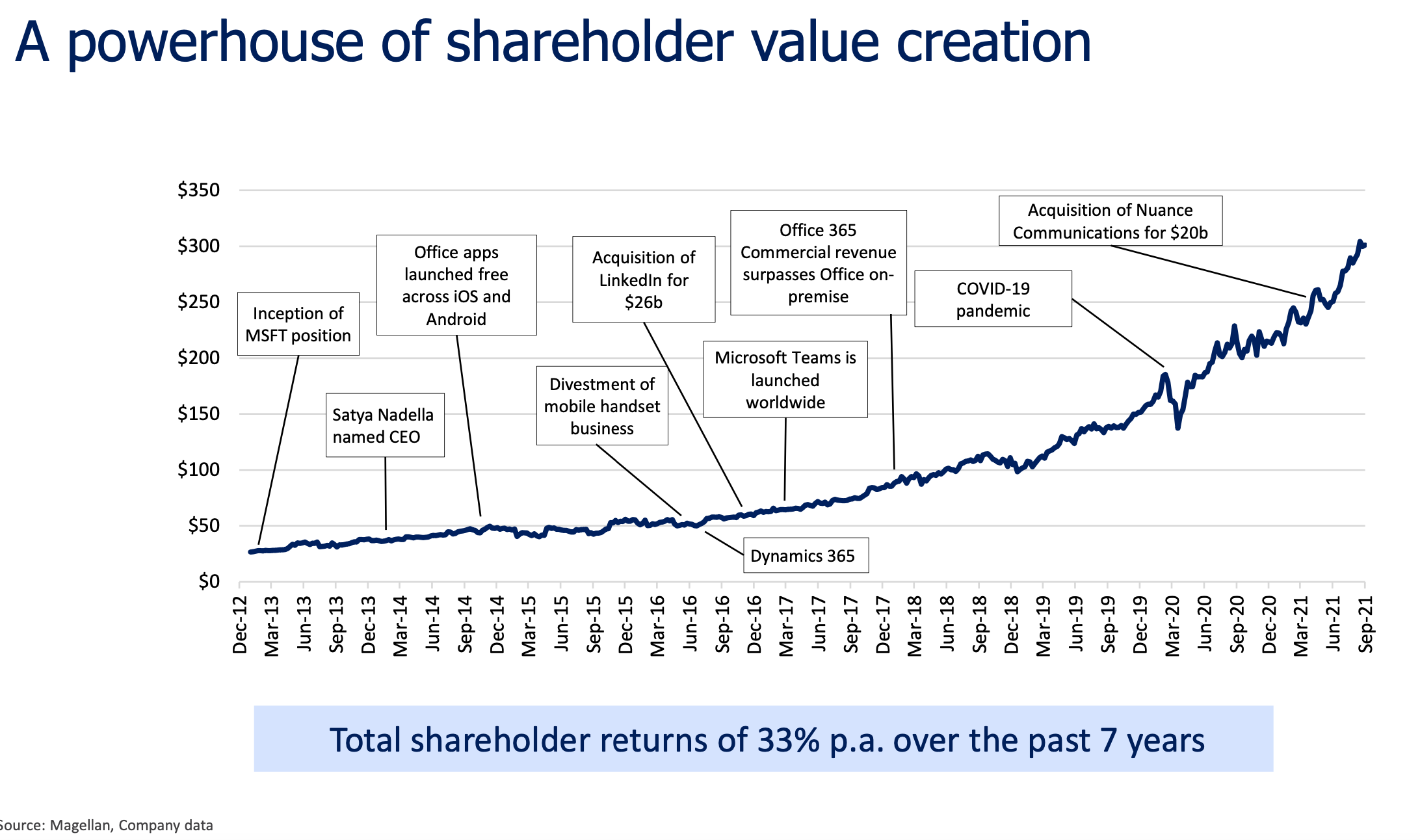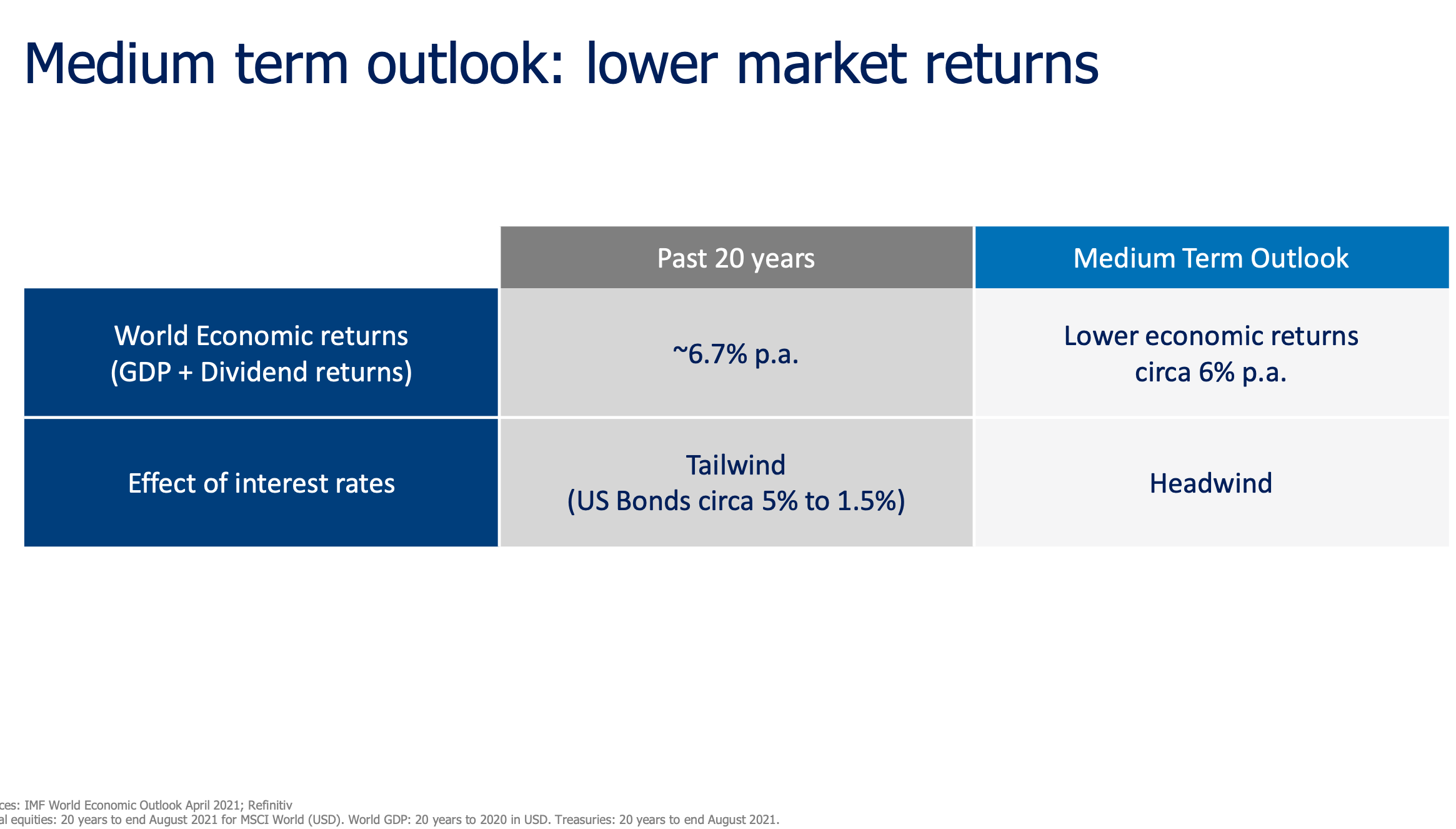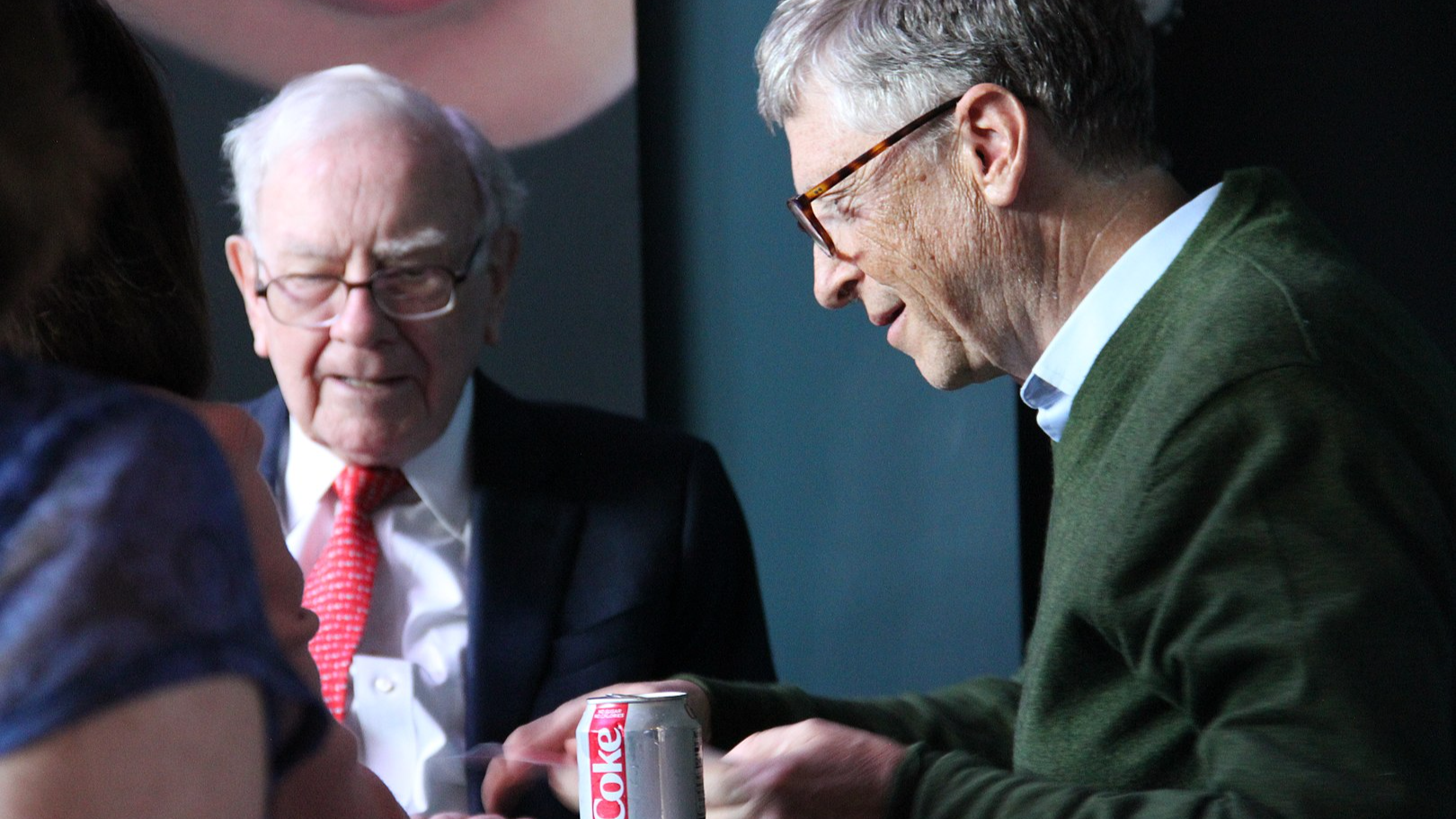Hamish Douglass: Another stock headed for the trillion-dollar club
As a kid, Hamish Douglass's walls were adorned with compounding tables. He’s also a big fan of the latest Netflix sensation Squid Game and thinks the streaming giant might be one of the next to reach a market cap of US$1 trillion. These were some of the new things I learned about the CIO and co-founder of global fund manager Magellan Financial Group during his latest webinar. While Douglass reiterated some of the same points he’s discussed previously – including his unapologetic approach to conserving capital (responding to the criticism he copped for sticking with defensives throughout 2020) and his Alibaba mea culpa – there were useful gems.
You may have heard before about Douglass’s positive view on one of his portfolio’s newer holdings, Netflix – but I was surprised at the conviction of his outlook for the video streamer in a presentation last week.
Describing it as a “long-term compounding machine,” his projections for subscriber growth and the acceleration in fees has Netflix joining the US$1 trillion club – alongside Apple, Amazon, Google and Microsoft (which he also loves) – within a decade.
It’s at this point Douglass also waxed lyrical about Squid Game, exhorting his audience to watch it while speaking about the quality of the streaming content now coming out of Netflix – which is increasingly catching the attention of Hollywood and scooping Grammy and Emmy awards.
(Ed note: Even though lockdown’s over for most of us, some other shows on Douglass’s hit list include Lupin, Money Heist and Narcos.)
"Simply the best"
Another big-name stock – which you might think hasn’t much growth left given it’s been listed since 1986 – also earns high praise.
“It’s simply the best,” Douglass said of the world’s biggest software firm, which is also his global fund’s largest position. Microsoft is also the second-largest provider of cloud-based software solutions, via its Azure business, which ranks the firm second only to Amazon but ahead of Google – at least on an ex-China basis, where Alibaba retains the top slot.
The Windows operating system has an 80% market share and is the leading security software player, Douglass said. “And as largely an enterprise company servicing businesses around the world, it’s not getting caught in the regulatory firestorm that’s attacking technology at the moment.”
Magellan first invested in the firm seven years ago when its shares were trading at US$28 - at the last close, MSFT stock was trading slightly north of $300 a share.
“Why haven’t we sold it when we’ve made 10 times our money? Because we’re highly confident it can continue to grow its revenues at above 10% per annum on average for the next decade,” Douglass said.
“This is extraordinary for a company of this scale.”
He expects Microsoft could be delivering revenues of more than US$400 billion in around 10 years’ time.

What’s driving this? The cloud, baby. Currently, Microsoft’s cloud business Azure comprises about 50% of group revenue. And Douglass anticipates that this business unit will be bigger than the entire Microsoft firm is currently by around 2030.
“We believe Microsoft is a true powerhouse for shareholders. The shift to the cloud is the reason,” he says, suggesting Magellan will probably end up holding the stock for 20 years or more – failing some huge calamity.
“We made mistakes”
Magellan’s flagship fund returned 10.8 per cent over the year ended 31 July, lagging a long way behind its benchmark's 27.5% return in Australian dollar terms. But overall, the fund retains its outperformance since the fund launched 14 years ago, returning almost 12% versus the market’s 7.7%.
And as in the past, Douglass is contrite without being overly apologetic (and rightly so, as far as I’m concerned).
“I’m not making any apology for having half our assets in defensive assets…we were one of the few strategies last year that protected people’s capital,” he said.
“After the vaccines, our defensive stocks dramatically underperformed the market, but we’re not going to just change our spots and flip out of defensive assets when it’s a core tenet of what we do.
“We didn’t do everything right but if we had sold those and invested those proceeds somewhere else, frankly, an investor in our fund should’ve killed us.”


Don’t judge Magellan on a single bad year
“Don’t get seduced by yesterday’s returns. Look at the consistency of returns over time before you make a judgement,” Douglass said.
“Some people have accused us of underperforming over the last year. We have relative to the global markets, but compared to our objectives, we have exceeded our 9% per annum over every time period we measure – and by quite a healthy margin.”
He acknowledged the mistakes he made on Alibaba – particularly the bet that Jack Ma would act in his own best interests rather than openly criticising the China Communist Party.
“If you get on the wrong side of the Communist Party, you’re going to find out you’re on the wrong side, there is no other alternative,” said Douglass.
“Jack Ma found out, which was very painful for us in the last year. We made the assumption he would act in his own personal interests but I was wrong on that. Now he’s going to be effectively imprisoned in China for the rest of his life and have no public profile, which has been a very costly mistake for Jack.”
But Douglass reaffirmed Magellan’s unquenchable belief in the growth story ahead for China. A couple of key reasons he cited are:
- National per capita income in China of about US$14,000 versus US$55,000 in Australia.
- The big lag in consumption versus the developed world, with an anticipated 4% per annum growth in consumption anticipated from China.
“A demographic time trap”
Alluding to the more nuanced approach his team is now taking on China, he regards regulatory risk in China as two-sided.
On one hand, you have what Douglass calls, “social policy regulation” – examples include the outright ban on private tutoring the state introduced as a way to indirectly boost the nation’s flagging birth rate. Even since scrapping its infamous “one-child policy,” China’s population growth has remained stubbornly low, primarily on the grounds that costs of living were too high. One key way the CCP is trying to address this – albeit rather bluntly – is by simply outlawing the often very expensive private tutoring firms.
But he places the likes of Alibaba in a far safer area of regulatory risk via its e-commerce and cloud computing operations – what Douglass terms “market efficiency risk,” which most developed countries are also grappling with in trying to regulate big technology firms.
But Magellan has scaled down its exposure to Tencent given it operates in the gaming sector - gambling - which is far more likely to also run afoul of the CCP sometime in the future.
“We’re taking a nuanced approach to China, with tighter risk limits…there’s more volatility in investing in China in the short-term because of the CCP risk,” Douglass said.
He also alluded to the actions of the CCP in clamping down on indebtedness in the Middle Kingdom, which has seen Evergrande teeter on the brink of bankruptcy. But this doesn’t sound alarm bells for the Magellan CIO, who regards the actions of the China government as a “controlled implosion” rather than the bursting of a bubble.
“In the next 12 months, we may well see, as a consequence, a slower economic scenario in China. But does that change our five- and 10-year view? No, it doesn’t,” Douglass said. On the contrary, he suggested it may well present further opportunities to buy more Chinese stocks.
Douglass also touched on the macro environment and some of the investor risks he regards as hiding in plain sight. This includes the remaining threat of a mutant variant of Coronavirus – which resists current vaccines – that could leave the world “back to square one” in dealing with COVID.
“And there is a big question about inflation. If there is persistent inflation – and it’s too early to make that call – and central banks have to reverse course, that could be very ugly for equity markets,” he said.
Acknowledging the deep uncertainty, Douglass gives equal weight to the views that markets could dive by between 20% and 30% at some point over the next 18 months, or that stocks could charge still higher without pausing.
Damned if you do, damned if you don't
“But whatever happens, people will say ’I told you so,’” he said.
“If markets and profits remain strong and nothing else happens, everyone will say ‘I told you that you should’ve been taking a lot of risk.’
“And if one of these corrections happens, everyone will be saying, ‘What were you thinking? It was obvious it was going to happen.’”
Instead, Douglass admits he doesn’t know what will happen, which is why Magellan is taking a “middle of the road approach.”
“It appears that money is falling from the skies with the world reopening and all this economic stimulus. That will wear off. But what is going to be the outlook for equity market returns if you take a five-, 10- or 15-year view into the future?
“In all likelihood equity markets as a whole are going to be less than 6% per annum over the long term and people need to lower their expectations.”

What does this mean for investor portfolios?
“You need to have a large part of your portfolio in what we call “ structural growth assets” – companies that over long periods of time can compound revenues at a multiple of what world GDP will grow at,” he said.
“They must have long duration behind them. It’s very different to cyclical growth, which doesn’t last for a decade.”
Douglass wrapped up his discussion in the same way he began – with a favourite Benjamin Franklin quote – which he believes sums up the Magellan approach and his own love of compounding: "Money makes money. And the money that money makes, makes money."


Never miss an insight
Enjoy this wire? Hit the ‘like’ button to let us know. Stay up to date with my content by hitting the ‘follow’ button below and you’ll be notified every time I post a wire. Not already a Livewire member? Sign up today to get free access to investment ideas and strategies from Australia’s leading investors.
4 topics
2 contributors mentioned

